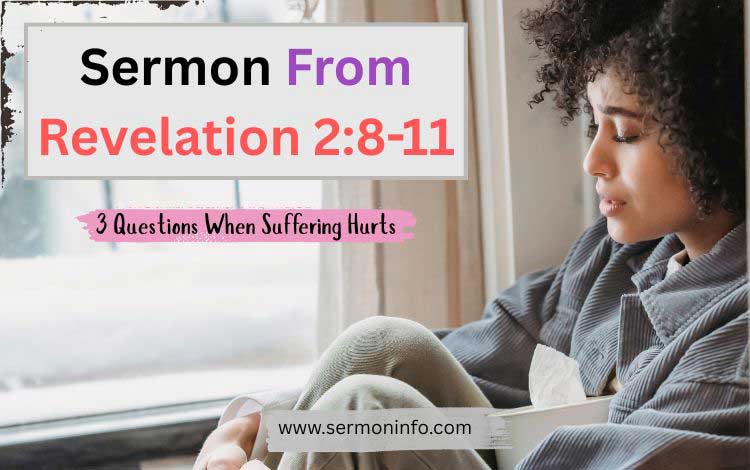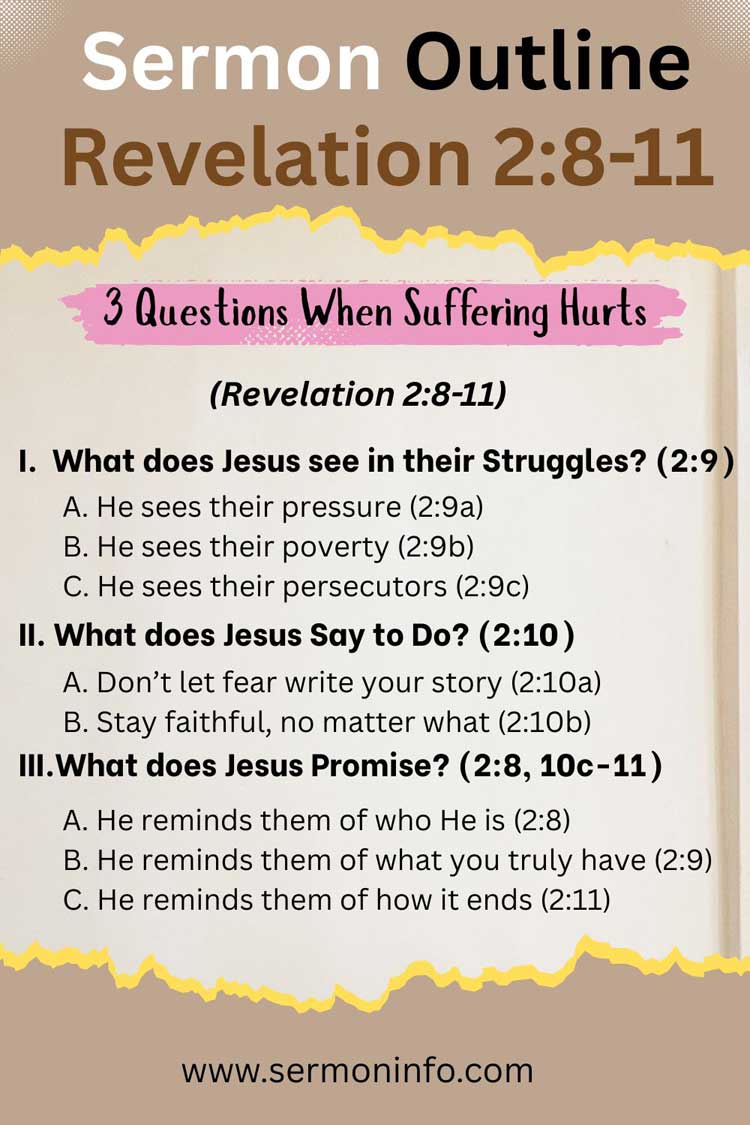Sermon From Revelation 2:8-11 (Smyrna) reveals to us how God transforms our pain into perseverance and our loss into lasting treasure.

Sermon From Revelation 2:8-11 (Smyrna)
Smyrna was a wealthy city, but the church there was poor, persecuted, and under pressure for following Jesus Christ. Still, Jesus didn’t promise escape—He offered something better: a crown for those who stayed faithful in the fire.
I remember a dear friend who clung to Christ through cancer, and her quiet trust preached louder than any sermon I’ve ever given.
In Revelation 2:8–11, Jesus asks us three heart-searching questions—because when suffering hurts, faith needs something solid to stand on.
1. What Does Jesus See in Their Struggles
“I know your works, tribulation, and poverty (but you are rich); and I know the blasphemy of those who say they are Jews and are not, but are a synagogue of Satan.” (Revelation 2:9)
A. He Sees Their Pressure (2:9a)
Jesus begins with these words: “I know your tribulation” (Revelation 2:9). He’s not speaking from a distance. He knows the weight you’re carrying. He walked this same path. When life presses in, He doesn’t offer cold theology—He offers Himself. He felt pressure in Gethsemane so intense that He sweat drops of blood. That’s divine empathy, not empty sympathy.
Some of you are carrying burdens no one else sees—financial strain, family pain, or quiet anxiety. Jesus sees it. He doesn’t shrug it off or tell you to toughen up. Instead, He whispers, “I know. I’m with you.” That’s what makes His presence powerful. He’s not just our Savior—He’s our Shepherd in the storm (John 10:11).
B. He Sees Their Poverty (2:9b)
Jesus says, “I know your poverty—yet you are rich” (Revelation 2:9). The believers in Smyrna didn’t have much materially. Their faith cost them jobs, status, and security. But Jesus didn’t measure their worth by Roman coins—He measured it by eternal riches. Faith is never bankrupt when Christ is your treasure.
The world might say you don’t have enough—but Jesus says you have more than you know. You may not own much, but if you have Him, you are rich beyond measure (2 Corinthians 8:9). Sometimes what feels like lack is actually God clearing space for eternal abundance. Don’t despise your “not enough” when Jesus is your portion.
C. He Sees Their Persecutors (2:9c)
Jesus also says, “I know the slander of those who say they are Jews and are not . . .” (Revelation 2:9). The Smyrna church faced real opposition. Their names were dragged through the mud. Lies spread. Character attacked. But Jesus saw it all. Not one harsh word or unjust action slipped past His watchful eye.
You might feel misunderstood or mistreated for your faith—maybe even in your own family. But Jesus knows. He experienced false accusations, mockery, and betrayal. He doesn’t ignore injustice. In fact, He honors those who stand firm under it (Matthew 5:11–12). So when people speak against you, remember who speaks for you. His voice is the one that matters most.
“This material provides some ideas and thoughts for a message from Revelation 2:8-11 on the topic: “3 Questions When Suffering Hurts.”
2. What Does Jesus Say to Do?
“Do not fear any of those things which you are about to suffer. Indeed, the devil is about to throw some of you into prison, that you may be tested, and you will have tribulation ten days. Be faithful until death, and I will give you the crown of life.” (Revelation 2:10)
A. Don’t Let Fear Write Your Story (2:10a)
Jesus says, “Do not fear what you are about to suffer” (Revelation 2:10). That’s not a soft encouragement—it’s a bold command. He doesn’t say suffering might come. He says it’s coming. But He also says, “Don’t be afraid.” Why? Because fear doesn’t get the final word—faith does. And He walks with us into the fire.
Fear has a way of shrinking God and enlarging our problems. But Jesus lifts our eyes. He reminds us that the trial has a boundary, and He holds it. He says, “Ten days.” That means the suffering has an expiration date. Your pain won’t last forever, but His promises will (Isaiah 43:1–2).
B. Stay Faithful, No Matter What (2:10b)
Jesus says, “Be faithful unto death, and I will give you the crown of life” (Revelation 2:10). That’s not just endurance—it’s devotion. He’s not calling us to just hang on. He’s calling us to lean in, to trust fully, even when life unravels. That’s the kind of faith that heaven crowns.
Some people quit when it gets hard. But Smyrna didn’t quit, and neither should we. Faithfulness doesn’t mean perfection—it means loyalty to Jesus when it costs us most. Paul echoed this in 2 Timothy 4:7–8: “I have fought the good fight… there is laid up for me the crown of righteousness.” Stay in the fight. The crown is worth it.
3. What Does Jesus Promise If We Endure?
“And to the [d]angel of the church in Smyrna write, ‘These things says the First and the Last, who was dead, and came to life . . . He who has an ear, let him hear what the Spirit says to the churches. He who overcomes shall not be hurt by the second death.'” (Revelation 2:8, 11)
A. He Reminds Them Who He Is (2:8)
Jesus introduces Himself as “the First and the Last, who died and came to life” (Revelation 2:8). That’s not just theology—it’s personal comfort. He’s saying, “I’m the One who has been before your trial began, and I’ll still be standing after it ends.” He’s walked through death itself—and He beat it.
This isn’t just a reminder of what He’s done—it’s a promise of what He’ll do for you. He’s not asking you to suffer for someone who hasn’t suffered. He’s the Savior who took nails, wore thorns, and rose again. When Jesus says, “Be faithful,” He’s already led the way.
B. He Reminds Them What You Truly Have (2:9)
Jesus said, “But you are rich” (Revelation 2:9). That’s not flattery—it’s truth from the One who sees clearly. The world saw poverty, but Jesus saw treasure. Smyrna’s riches weren’t in gold or comfort—they were in grace, courage, and unshakable faith. They lost much on earth, but they had everything in Christ.
You might feel empty, overlooked, or forgotten—but Jesus sees wealth where others see waste. Heaven measures differently than earth. If Jesus calls you rich, don’t argue. Rejoice. Ephesians 1:3 reminds us that we’ve been “blessed with every spiritual blessing.” You’re not lacking—you’re loaded with grace.
C. He Reminds Them How It Ends (2:11)
Jesus gives this assurance: “The one who conquers will not be hurt by the second death” (Revelation 2:11). That’s a promise with eternal weight. The first death may touch us—but the second can’t reach us. Eternal judgment won’t come near the faithful in Christ. That’s victory you can build your life on.
There’s a crown ahead. There’s a life beyond this one. Whatever you’re going through, it’s not the end. Jesus reminds us that faithful suffering ends in everlasting glory (Romans 8:18). Don’t let the pain of now blind you to the promise of forever. You win in Christ. Hold on.
Conclusion
So what do we do when suffering hurts? We remember what Jesus sees, what He says, and what He promises.
He sees your pressure, your poverty, and your persecutors. He says, “Don’t be afraid—stay faithful.” And He promises life that never ends.
I once sat beside a widow who lost everything but never lost her joy. Her secret? She trusted the One who holds the crown.
So keep trusting. Keep walking. Keep looking to Jesus—because He sees you, walks with you, and finishes what He starts.
Source Material
7 Churches of Revelation Explained Written Article Summarizing the 7 Churches of Revelation
Believer’s Bible Commentary by William MacDonald
The MacArthur Bible Commentary by John MacArthur
You Can Understand the Book of Revelation by Skip Heitzig
40 Days Through Revelation by Ron Rhodes
Revelation by Charles C. Ryrie
